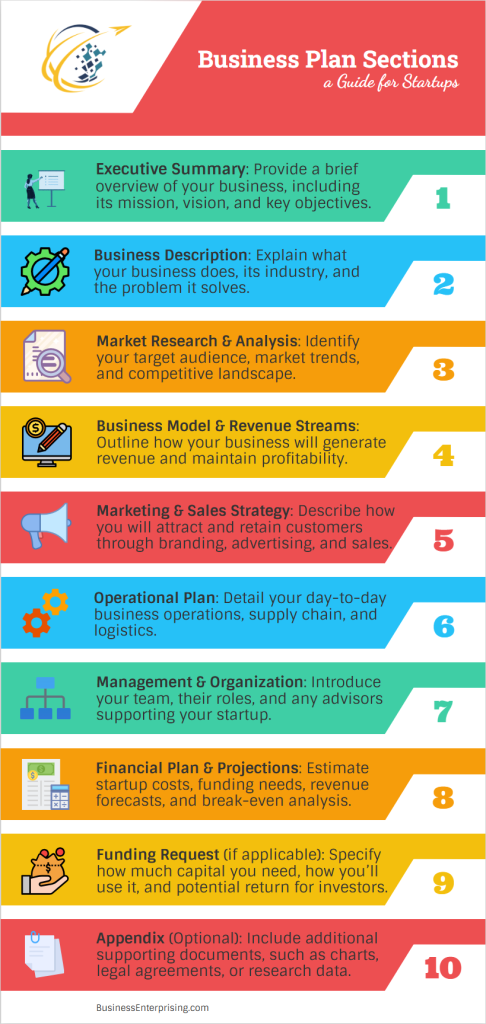 Embarking on a new business venture requires meticulous planning and foresight. Creating a startup business plan is a fundamental step in this process. This document serves as a roadmap, outlining your business goals and the strategies to achieve them. By detailing each aspect of your business, you set a clear path toward success.
Embarking on a new business venture requires meticulous planning and foresight. Creating a startup business plan is a fundamental step in this process. This document serves as a roadmap, outlining your business goals and the strategies to achieve them. By detailing each aspect of your business, you set a clear path toward success.
A well-structured business plan offers numerous benefits. First, it compels you to thoroughly analyze your business idea, ensuring its feasibility. This analysis helps identify potential challenges and opportunities, allowing for proactive solutions. Additionally, a comprehensive plan is instrumental when seeking funding. Investors and lenders often require a detailed business plan to assess the viability of your venture. Presenting a solid plan demonstrates your commitment and preparedness, increasing their confidence in your project.
Moreover, a business plan serves as a management tool, guiding your decisions as your business evolves. It helps keep your team aligned with the company’s objectives and facilitates the monitoring of progress. By regularly reviewing and updating your plan, you can adapt to market changes and maintain your competitive edge. This dynamic approach ensures that your business remains responsive and resilient in a fluctuating environment.
Dedicating time and effort to creating a startup business plan is an investment in your company’s future. It lays the foundation for informed decision-making, effective management, and sustainable growth. As you embark on your entrepreneurial journey, a well-crafted business plan will be an invaluable guide, steering your venture toward success.
Introduction: The Importance of a Startup Business Plan
Creating a startup business plan is essential for turning your entrepreneurial vision into a structured strategy. A well-crafted plan serves as a roadmap, guiding your business from inception through growth phases. It outlines your objectives, strategies, and the steps necessary to achieve them, providing clarity and direction. Without this foundation, navigating the complexities of starting a business becomes challenging.
Moreover, a comprehensive business plan is instrumental in securing funding. Investors and lenders seek assurance that your venture has been thoroughly planned and has potential for success. By presenting detailed financial projections, market analyses, and operational strategies, you demonstrate preparedness and commitment. This transparency increases confidence among potential financiers, enhancing your chances of obtaining the necessary capital.
Additionally, your business plan aids in making informed strategic decisions. It allows you to anticipate challenges and identify opportunities within your market. By regularly reviewing and updating your plan, you can adapt to changing circumstances and maintain alignment with your goals. This proactive approach ensures that your business remains agile and responsive in a dynamic environment.
Creating a startup business plan is a critical step toward entrepreneurial success. It not only facilitates funding but also serves as a strategic tool for informed decision-making. By investing time and effort into developing a robust plan, you lay the groundwork for a sustainable and thriving business.
Executive Summary: Crafting a Strong First Impression
When creating a startup business plan, the executive summary serves as your company’s first impression. This section provides a snapshot of your business, highlighting key elements to engage readers. A compelling executive summary can capture attention and encourage further interest.
To craft an effective executive summary, begin by clearly stating your company’s purpose. Describe the problem your business aims to solve and how your product or service addresses this issue. This approach immediately conveys the value proposition to your audience.
Next, introduce your target market. Identify who your customers are and explain why they need your solution. This information demonstrates market awareness and potential demand.
Additionally, outline your business model. Clarify how your company plans to generate revenue and achieve profitability. This insight reassures readers of your venture’s financial viability.
Furthermore, provide a brief overview of your team. Highlight the experience and expertise that each member brings to the startup. A strong team can instill confidence in your company’s ability to execute its plans.
Finally, summarize your financial projections and funding requirements. Present realistic forecasts and specify the capital needed to reach your goals. This transparency helps potential investors understand the opportunity and risks involved.
To keep your executive summary concise yet compelling, focus on the most critical information. Use clear, straightforward language and avoid unnecessary jargon. Aim for brevity without sacrificing essential details. Remember, this section should entice readers to explore the full business plan for a deeper understanding.
Market Research & Competitive Analysis
When creating a startup business plan, conducting thorough market research and competitive analysis is essential. Understanding your target audience and staying informed about market trends enables you to tailor your offerings effectively. Additionally, analyzing competitors allows you to position your startup strategically within the industry.
To identify your target audience, start by defining the demographics, behaviors, and preferences of potential customers. Engage in primary research methods, such as surveys, interviews, and focus groups, to gather firsthand insights. These approaches provide valuable information about customer needs and expectations. Additionally, analyze existing data and industry reports to understand broader market trends. This combination of primary and secondary research offers a comprehensive view of the market landscape.
Analyzing competitors involves assessing their strengths and weaknesses to identify opportunities for differentiation. Examine aspects such as product offerings, pricing strategies, marketing tactics, and customer feedback. This analysis helps you understand what competitors do well and where they fall short. Consequently, you can identify gaps in the market that your startup can fill. By leveraging this information, you can develop unique selling propositions that set your business apart.
Effective competitive analysis also involves monitoring emerging trends and potential disruptors in your industry. Stay informed about technological advancements, regulatory changes, and shifts in consumer behavior. This proactive approach allows you to anticipate challenges and adapt your strategies accordingly. Moreover, understanding the competitive landscape aids in making informed decisions about pricing, distribution, and promotional efforts.
Business Model & Revenue Generation
When creating a startup business plan, selecting the appropriate business model is a pivotal decision. Your choice therefore dictates how your company delivers value and generates revenue. Moreover, aligning your business model with your product and market needs establishes a solid foundation for success.
Various business models exist, each with distinct advantages. For instance, the subscription model offers customers continuous access to services for a recurring fee. As a result, this approach provides predictable revenue and fosters long-term customer relationships. Alternatively, the freemium model provides basic services at no cost, thereby enticing users to upgrade for premium features. Consequently, this strategy attracts a broad user base and encourages conversions over time. Additionally, the direct-to-consumer model eliminates intermediaries, thus allowing you to sell products directly to customers. In turn, this direct engagement can enhance profit margins and customer loyalty.
After selecting a business model, forecasting revenue streams then becomes essential. First, begin by estimating sales volumes based on market research and target audience analysis. For example, if adopting a subscription model, you should subsequently project the number of subscribers and their retention rates. Furthermore, consider factors like pricing strategies and market conditions that may influence sales. Accordingly, regularly reviewing and adjusting these projections ensures they remain realistic and aligned with actual performance.
Financial sustainability ultimately hinges on accurate forecasting and effective cost management. Initially, identify fixed and variable expenses, including production, marketing, and operational costs. By comparing projected revenues against these expenses, you can therefore determine breakeven points and profitability timelines. As a result, this analysis aids in making informed decisions about scaling operations and allocating resources efficiently.
Marketing & Operational Strategies
When creating a startup business plan, developing effective marketing and operational strategies is essential. A well-crafted marketing plan enhances brand visibility, attracting and retaining customers. Simultaneously, efficient operational processes ensure smooth delivery of products or services, fostering customer satisfaction.
To elevate brand visibility, start by defining your brand’s purpose and values. This clarity guides consistent messaging across all channels. Next, identify your target audience by analyzing demographics, behaviors, and preferences. Tailoring your marketing efforts to this audience increases engagement. Additionally, utilize digital marketing techniques, such as search engine optimization (SEO) and social media marketing, to reach a broader audience. These methods enhance online presence and attract potential customers. Furthermore, creating valuable content that resonates with your audience establishes authority and trust. Regularly monitoring and adjusting your strategies based on performance metrics ensures continuous improvement.
Operational efficiency involves outlining key processes and logistics to deliver your offerings effectively. Begin by mapping out the supply chain, from sourcing raw materials to delivering finished products. Identifying potential bottlenecks allows for proactive solutions. Implementing technology, such as inventory management systems, streamlines operations and reduces errors. Additionally, maintaining transparent communication with suppliers and partners fosters collaboration and reliability. Regularly reviewing operational performance helps identify areas for improvement, ensuring scalability as your startup grows.
Integrating robust marketing and operational strategies into your business plan not only attracts customers but also ensures their satisfaction through efficient service delivery. This comprehensive approach lays the groundwork for sustainable growth and success in a competitive market.
Financial Planning & Projections
When creating a startup business plan, meticulous financial planning and accurate projections are essential. This process involves estimating startup costs, determining funding requirements, and forecasting revenue and expenses to achieve financial sustainability.
To begin with, identify all initial expenses your business will incur before generating revenue. These costs typically include equipment purchases, office space rental, legal fees, marketing expenses, and initial inventory. According to the U.S. Small Business Administration, calculating these startup costs is crucial for requesting funding and estimating when your business will become profitable. By compiling a comprehensive list, therefore, you can determine the total capital needed to launch your venture.
Once you’ve estimated startup costs, you should then assess your funding needs. Decide how much capital you can contribute personally and how much you’ll need to raise from external sources. Options for external funding include loans, angel investors, or venture capital. As a result, a clear understanding of your funding requirements enhances your ability to secure the necessary resources to start your business.
After establishing funding, subsequently develop realistic revenue and expense forecasts. First, project your expected sales based on market research and industry trends. Consider factors such as pricing strategies, target market size, and competition. Next, outline your anticipated expenses, including fixed costs like rent and salaries, and variable costs like utilities and materials. According to Indeed.com, financial projections help predict future revenue and expenses, which are consequently essential for planning and securing investment. Furthermore, regularly updating these forecasts allows you to adapt to changing market conditions and maintain financial stability.
Conclusion
Creating a startup business plan is a foundational step in transforming your entrepreneurial vision into a structured strategy. This document serves as a roadmap, guiding your business from inception through growth phases. By detailing your objectives, strategies, and the steps necessary to achieve them, it provides clarity and direction. Without this foundation, navigating the complexities of starting a business becomes challenging.
Moreover, a comprehensive business plan is instrumental in securing funding. Investors and lenders seek assurance that your venture has been thoroughly planned and has potential for success. By presenting detailed financial projections, market analyses, and operational strategies, you demonstrate preparedness and commitment. This transparency increases confidence among potential financiers, enhancing your chances of obtaining the necessary capital.
Additionally, your business plan aids in making informed strategic decisions. It allows you to anticipate challenges and identify opportunities within your market. By regularly reviewing and updating your plan, you can adapt to changing circumstances and maintain alignment with your goals. This proactive approach ensures that your business remains agile and responsive in a dynamic environment.
In conclusion, creating a startup business plan is a critical step toward entrepreneurial success. It not only facilitates funding but also serves as a strategic tool for informed decision-making. By investing time and effort into developing a robust plan, you lay the groundwork for a sustainable and thriving business.




